Fair Agenda Blog
Last week we stood in the gallery of Queensland Parliament, watching as 50 MPs cast the votes that made history, and decriminalised abortion in Queensland.
That majority vote was the culmination of more than 2.5 years of campaigning by the Fair Agenda community and our partners, building on decades of work by pro-choice activists in Queensland. And it was only possible because thousands of Fair Agenda members relentlessly took dedicated action over the course of years.
This is one of the biggest campaign victories in Fair Agenda’s history. And, if we want to also win desperately needed change in NSW (where abortion also remains a criminal offence), we’re going to have to do all this, and more, again.
Here’s how Fair Agenda members helped make this historic change possible:
Back in May 2016, when independent Queensland MP Rob Pyne introduced new health laws to decriminalise abortion, thousands of Fair Agenda members came together to show huge public support for change. Together we drove local actions in MP’s electorates: meeting with key undecided MPs...

Flooding MPs with constituent emails, and delivering testimonies to MPs in their electorate offices...

And, in the lead up to the expected vote Fair Agenda and partners amplified the voices of medical experts in online and newspaper adverts.
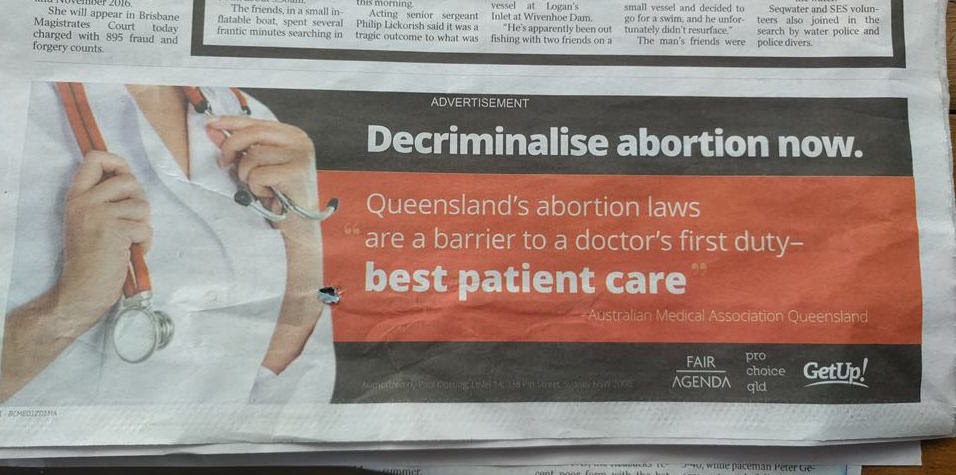
Together we made headlines, and made sure every single MP received polling showing that an overwhelming majority of Queenslanders support decriminalisation.
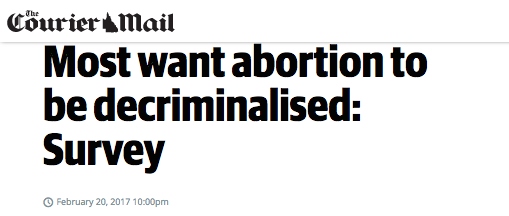
Then, in February 2017, when it was revealed that the proposed legislation wouldn’t have enough votes to pass the parliament, and abortion reform was instead referred to the Law Reform Commission - we got ready to make abortion access an issue at the looming election.
To make that happen - we knew voters would need to know their candidates' views on abortion reform. So, Fair Agenda launched a pro-choice candidate pledge – and asked all major party candidates to declare that if elected, they would back compassionate abortion reform.
And, within days of the election being called, we secured pro-choice pledges from almost 100 candidates -- putting this issue in the election headlines by day 6 of the election campaign!

Fair Agenda members then chipped in to fund strategic polling - to prove to candidates that it was in their interests to be upfront about where they stand on abortion. That polling put this issue in the headlines yet again - showing candidates across the country what was at stake if they refused to be upfront about their position!
Throughout our election campaign, Fair Agenda secured commitments from 154 candidates that they would support strong and evidence-based pro-choice reforms if elected. Then we launched a powerful online tool that allowed Queensland voters to quickly and easily find out their local candidates' stance on decriminalising abortion.
Fair Agenda volunteers then took to the streets of Brisbane in the blood red cloaks and white bonnets of the Handmaid’s Tale, to let voters know where they could find out their candidates' stances on this issue.
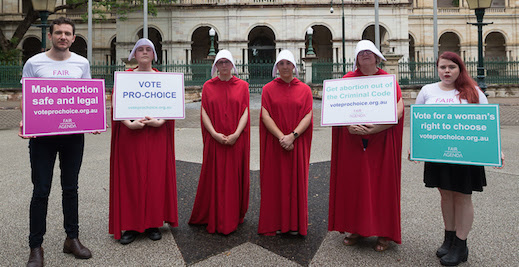
Together we put abortion decriminalisation on the state election agenda – and helped ensure eight pro-choice candidates won key marginal seats, and that four anti-choice candidates lost theirs!
Then, when the Law Reform Commission started considering its recommendations on new abortion laws, the Fair Agenda community got ready to do everything possible to convince undecided MPs to vote in support of new laws.
Together we mobilised, campaigned and lobbied like never before. On the day proposed laws were announced, we turned out for a snap rally, and stood alongside service providers and legal experts to show media and MPs that these laws had our support.

We worked with our pro-choice partners to amplify the voices of affected people, and of medical experts who could speak to the harm the laws were having on Queenslanders.
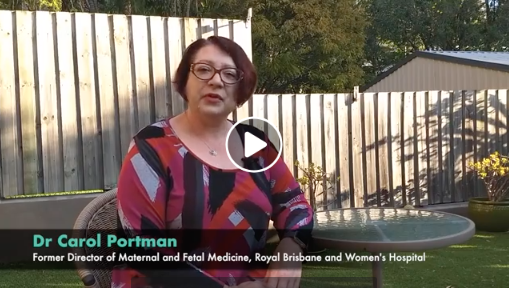
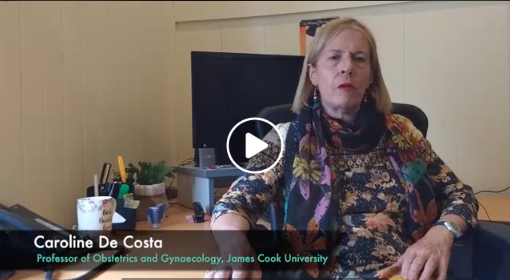
We had one objective: to demonstrate widespread public support for safe, legal and compassionate abortion care and persuade MPs to vote accordingly.
We commissioned hard-hitting polling across the state, and in the seats of key undecided MPs, and demonstrated broad scale community and expert support in an open letter that we then placed as a full page advert in the local paper distributed to key undecided MPs.
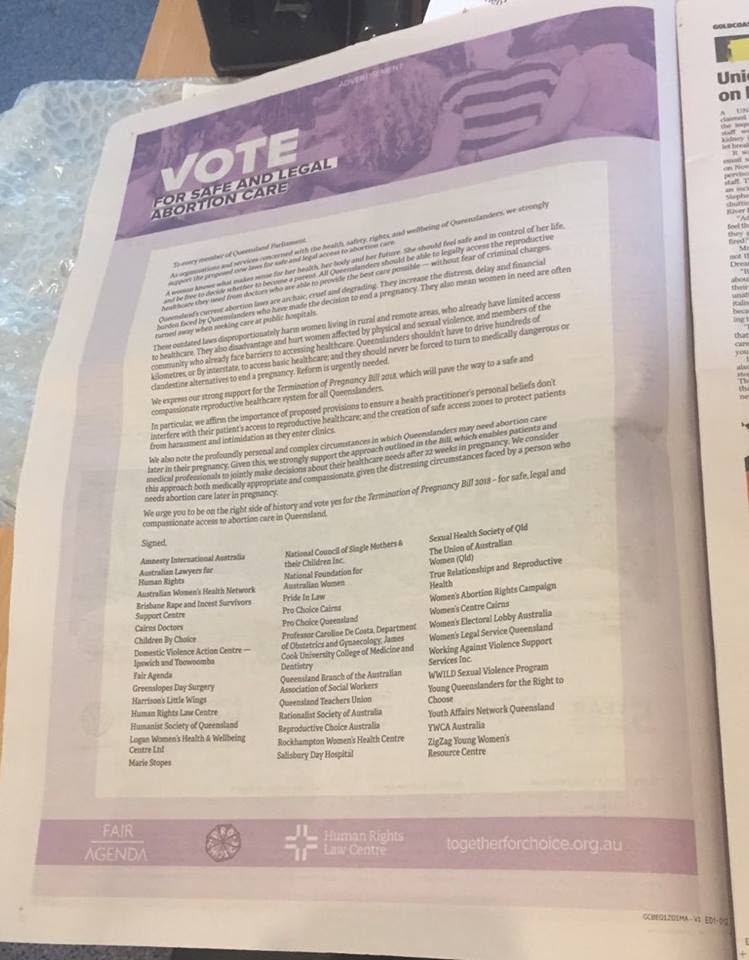
And then, just days before the vote, Fair Agenda teamed up with Young Queenslanders for the Right to Choose to organise the biggest pro-choice rally Brisbane has ever seen (and in torrential rain, no less) - joining more than a thousand Queenslanders to march to Speakers Corner and send parliamentarians a message they couldn't ignore.
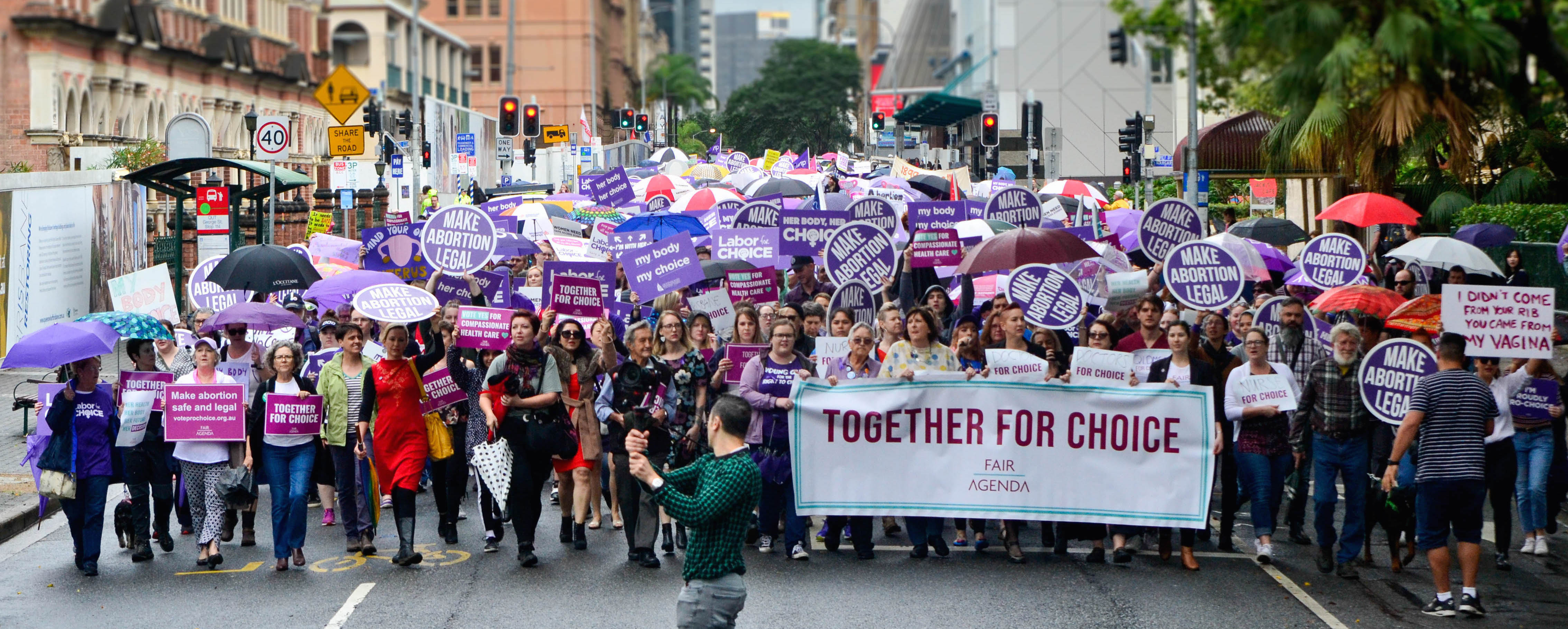
In the end, after years of work by Fair Agenda and parters, the laws passed 50-41 with three LNP MPs, Tim Nicholls, Steve Minnikin and Jann Stuckey, breaking party ranks to support the bill.
When the final vote was read aloud, the gallery erupted in cheers (and tears).
It was an incredible win - and it wouldn’t have been possible without the support of thousands of Fair Agenda members who volunteered, donated, made calls and emails, and showed up to marches. It's a testament to the growing power and potential of our community.
But we know the fight for reproductive autonomy isn't over. In fact, the Fair Agenda community will need to do this, and more, all over again if we're going to help win safe and legal access to abortion care in NSW.
With your help, we can help share the momentum and lessons our community learnt during our joint campaigning in Queensland, in NSW - and work with partners in NSW to make the call for change so loud politicians can’t ignore it.
We know that the momentum is already building - just this morning NSW Opposition Leader Luke Foley announced that he backs decriminalisation, and if elected, will task the Law Reform Commission with putting forward a model for the NSW parliament to consider. This wouldn’t be possible without the long, hard work being done by local NSW groups; combined with the momentum Fair Agenda and partners built for safe, legal and compassionate access to abortion care over recent years and weeks in Queensland.
As you may have seen, last month the Queensland Government announced new legislation to reform the state’s abortion laws.
The proposed laws are really promising, and are almost exactly what Fair Agenda and other groups have been advocating for.
These are really positive laws; so Fair Agenda members have been hard at work doing everything we can to ensure they're passed by the parliament.

Third, the team have collected powerful personal stories from Queenslanders who have been impacted by the current laws - which we're currently releasing in a series of powerful online videos, you can see one of them here.
So we've been supporting community members and expert organisations to make submissions, and ensure pro-choice voices are heard in this process. If you're interested, you can see the how-to guide we developed here.
#2. We're also shoring up votes to ensure enough MPs support these changes when they're brought to a vote. Sources have told us the vote will be close, so we’re prioritising 11 target MPs to get the legislation over the line.
#3. We are also contacting each and every state MP to ask them how they plan to vote on the legislation — and we'll use the results to help focus member attention, and drive media coverage around the issue.
And, of course, we'll be working to respond to anything the anti-choice groups throw at us.
Scott Morrison has just been named leader of the Liberal Party, and therefore the next Prime Minister.
So, what is his track record on women's issues? Here are some lowlights:
- Earlier this year, when asked about the gendered impact of the proposed income tax cuts (which analysis showed would benefit men more than women, at a rate of two to one). Then Treasurer Morrison dismissed concerns of journalists, saying: “The tax system does not discriminate on gender. You don’t get pink forms and blue forms to fill out your tax return. That’s not how it works.” Read more here.
- In May this year, when asked why Party leaders didn't intervene to protect Jane Prentice, one of the few female Assistant Ministers in the Government's ranks from losing her pre-selection to a young male councillor, then Treasurer Morrison said, "I couldn't see why. It's a matter for the LNP. That's how these things work." Read more here.
- In August last year, following the announcement of a plebiscite on marriage equality, then Treasurer Scott Morrison said "I am voting no, it is OK to say no and people should know that... it[s] important that we have given the Australians an opportunity to have their say.' Read more here.
- In 2015 as Social Services Minister, Morrison responded to questions about his Government's plan to cut working parents' time to care for their newborns, saying cuts to paid parental leave are "certainly a First World issue". His comment was made in response to concerns raised by the Human Rights Commission that the policy could breach international human rights obligations. Read more here.
- In 2015 as the Social Services Minister, Morrison introduced cashless debit cards, a system that a bipartisan human rights committee said would discriminate against women and First Nations people. Peak Aboriginal health groups have since called the cards a reminder that those using them are second and third class citizens; and said they have detrimental impacts on both the mental and physical health and wellbeing of those subjected to them. Read more here.
- In 2014 as Immigration Minister, Morrison used his position to intervene, express personal concerns, and "restrict options" for the decision-making of a woman seeking asylum about terminating her pregnancy. This was despite advice from staff that he should leave the case to the medical staff. Read more here.
We deserve leaders who will fight for a fair, equal and safe future for all women. But change doesn’t just happen.
Join the fight for a fair and equal future: fairagenda.org/join
To the Members of NSW Parliament,
We write to express our concern about the harassment and intimidation of patients seeking abortions at NSW clinics. As experts in our respective fields, we urge you to vote in support of the Public Health Amendment (Safe Access to Reproductive Health Clinics) Bill 2018, which would create 150 metre safe access zones around abortion clinics in NSW.
All people should be able to access the healthcare they need safely, with dignity and in privacy.
Yet patients and healthcare workers across NSW are being harassed and intimidated as they enter reproductive healthcare facilities. There are reports of people being jostled, yelled at, and even filmed outside abortion clinics. This is unacceptable by any modern standard.
Reproductive healthcare decisions are personal medical decisions. Women must be able to access health professionals who are qualified, trained and equipped to provide the support and information they need to make the best decision about their bodies.
No person should have to fear a gauntlet of harassment and intimidation just to see their doctor about a personal medical decision.
Many women who have endured sexual assault rely on reproductive health services for care. Being abused, jostled, or recorded as they walk towards a clinic poses a risk of additional trauma, and could mean that they are unable to access vital healthcare when they need it.
This is about safe and equitable access to reproductive healthcare.
We strongly support the introduction of 150 metre ‘safe access zones’ around health services that provide abortions in NSW. Similar safe access zones are already successfully operating in in Victoria, the ACT, Northern Territory and Tasmania.
We urge you to protect patients’ rights to privacy, safety and dignity by voting in favour of this Bill.
Signed,
Fair Agenda
Human Rights Law Centre
NSW Council for Civil Liberties
New South Wales Nurses and Midwives’ Association
Australian Nursing and Midwifery Federation NSW
Public Health Association Australia
Women’s Electoral Lobby
National Foundation for Australian Women
Women’s Legal Service NSW
Community Legal Centres NSW
NSW Rape Crisis Centre
Domestic Violence NSW
Women's Domestic Violence Court Advocacy Service NSW Inc
NCOSS
No To Violence
Kingsford Legal Centre
Family Planning NSW
Marie Stopes
This year’s federal budget is not only disappointing, but potentially dangerous for women affected by family violence, according to domestic violence and women’s groups.
Fair Agenda, Domestic Violence NSW, National Family Violence Prevention Legal Services Forum, No to Violence, the National Association of Community Legal Centres (NACLC) and the National Foundation for Australian Women (NFAW) have jointly expressed despair that the Government has, once again, allocated inadequate resources to the services women rely on to escape abuse.
“It’s great the Turnbull Government is talking about providing women with real choice and access to opportunity. But women won’t have real choice and opportunity if they don’t have the chance to escape abuse and to live free from violence.” Says Renee Carr, Executive Director of Fair Agenda.
“We’re bitterly disappointed that there appears to be just $18.2 million of funding announced for domestic violence focused services tonight. That’s a fraction of what’s needed to ensure that every woman who needs crisis support, a safe and affordable place to live, or community legal support to get ongoing protection and navigate lengthy court processes, can access specialist services that are safe and understand their needs. Tonight’s announcement also does nothing to address the number of men perpetrating family violence.” Says Moo Baulch, CEO of Domestic Violence NSW.
“Last year the Victorian Government announced a $1.9 billion package to address domestic violence in the state. We need the same level of commitment and leadership from the Turnbull Government in its areas of responsibility.“ she added.
“The Treasurer declared in his budget speech that one of the five things the Turnbull Government must do with this budget is ‘keep Australians safe’, but made no mention of tackling domestic violence; and appears to have announced very little that will help the huge numbers of women and children who remain unsafe and under threat in their homes.” Ms Carr said.
“There is no new money for frontline domestic and family violence services and no mention of specialist support or affordable safe housing for families escaping domestic and family violence. In the year of #MeToo and the context of the Turnbull Government’s repeated commitments to prioritising the elimination of violence against women the silence from the Treasurer tonight is deafening.” Added Ms Baulch.
The most recent AIHW data shows requests for assistance for domestic and family violence rose in 2016-17, with 14,000 more requests for assistance by specialist homelessness services than the previous year.
“The Turnbull Government’s decision to inadequately resource family violence services is a choice that will leave thousands of families without the support they need to stay out of hospital, to make it in to work or their place of study, to be healthy and happy parents, and know they’ll be returning to somewhere safe and affordable at the end of their day. “ added Ms Carr.
“Aboriginal and Torres Strait Islander women experience family violence at vastly disproportionate rates. The women who rely on our service are 32 times more likely to be hospitalised and 10 times more likely to die of a violent assault.” Said Antoinette Braybrook, Convenor of the National Family Violence Prevention Legal Services Forum.
“Yet our services nationally remain chronically underfunded. Our women deserve to have access to culturally safe services like Family Violence Prevention Legal Services.” She added.
“Community Legal Centres are a vital part of the legal framework in responding to and addressing family violence. Every day women visit Community Legal Centres to get information about their rights, to escape abuse, to keep their children safe, or to keep a roof over their heads.” said Amanda Alford, Acting CEO of the National Association of Community Legal Centres.
“Yet every year our centres are forced to turn away hundreds of thousands of people. That means women aren’t getting the legal help they so desperately need. Tonight’s budget appears to have failed to invest in these vital frontline services.” she added.
“When it comes to men who use family violence, the ‘the lock them up and throw away the key’ approach is futile, costs the taxpayer millions, and is a short-term fix for recidivism.” said Jacqui Watt, CEO of No to Violence, the peak body for groups working with men to end family violence.
“We need community-based responses; for example more funding into men’s intake referral services, Men’s Behaviour Change Programs, and case management. We would have liked to have seen a greater commitment from the Federal Government, and disappointingly, we haven’t.” she added.
“In this year’s budget the Turnbull Government has prioritised cutting corporate tax. Women’s safety and freedom from violence should have been an equivalent priority. If it had been, we’d have seen the Federal Government matching the Victorian Government’s recent commitment to frontline services so that victim-survivors can get the support they need to be safe.” Ms Baulch added.
A 2011 national survey showed that 48% of respondents who experienced domestic and family violence said the violence had affected their ability to get to work. 10% needed to take time off work. Further, women who experience domestic and family violence are more likely to have a disrupted work history, and to have to change jobs at short notice.
Fair Agenda, Domestic Violence NSW, National Family Violence Prevention Legal Services Forum, No to Violence, NACLC and NFAW are jointly calling on the Turnbull Government to ensure women affected by domestic and family violence also have genuine choice and opportunity; by adequately funding the services needed to address a leading contributor to their injury, illness and death.
They are calling for the Federal Government to match the Victorian Government’s recent $1.9 billion funding commitment to domestic violence prevention and response.

